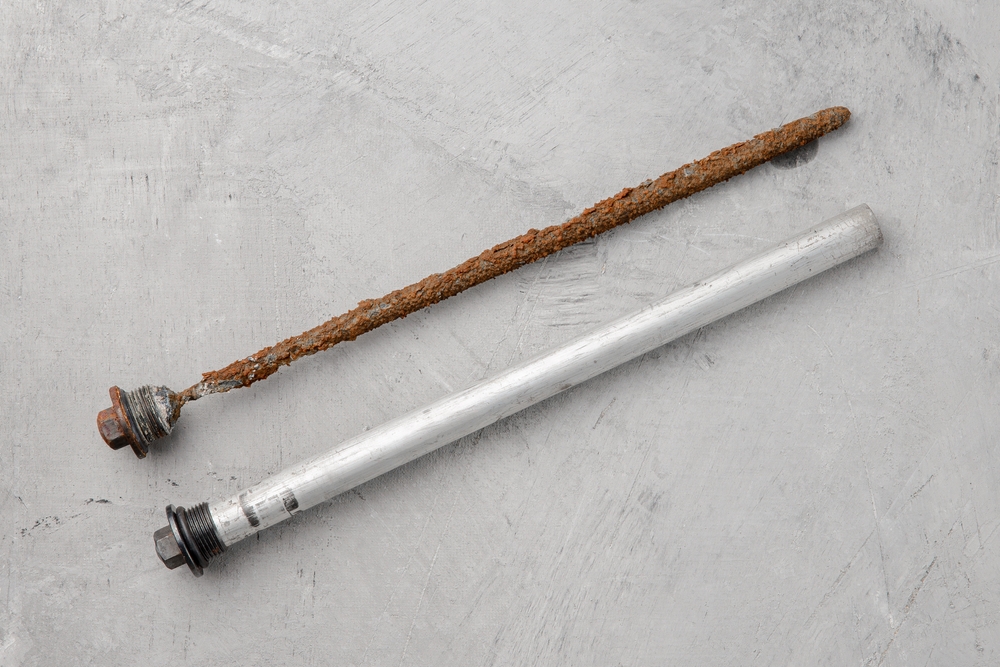November 26, 2024
Anode Rods in Water Heaters: What to Know
Understanding the role of the anode rod is an integral part of maintaining your water heater. This small, often overlooked component is its secret weapon. It works diligently to extend its lifespan and ensure your hot water stays clean and reliable by preventing internal corrosion.
In this blog, we’ll dive deep into what an anode rod is, how it works, when to check and replace it, and which type is best for your home.
What is an Anode Rod?

An anode rod is a metal rod installed inside your water heater tank. Its primary purpose is to protect the tank from corrosion. Made from magnesium, aluminum, or zinc, the rod is designed to attract corrosive elements in your water and prevent them from attacking the steel tank lining.
Without an anode rod, your water heater tank would rust more quickly, potentially leading to leaks, system failure, or even rupture.
How Do Anode Rods Work?
The science behind anode rods is simple but effective. These rods rely on a process called electrochemical reaction. Since the rod is made of a material that is more “sacrificial” (i.e., reactive) than the steel of your water heater tank, corrosive elements target the rod instead of the tank itself.
This sacrificial process means the anode rod gradually erodes over time, sparing the water heater tank from damage. As a result, you may need to replace your anode rod periodically.
How to Check Your Water Heater’s Anode Rod
Checking your anode rod is a relatively straightforward process. Here’s a step-by-step guide:
- Turn Off Power and Water:
- For electric water heaters, switch off the power at the circuit breaker.
- For gas water heaters, set the thermostat to the “pilot” setting.
- Shut off the cold water supply going into the water heater by closing the valve.
- Drain a Few Gallons of Water:
- Attach a hose to the drain valve and release a few gallons to lower the water level below the rod.
- Turn on a hot water faucet to release the remaining hot water and air in the pipes.
- Locate the Anode Rod:
- The anode rod is typically located on the top of the water heater. Look for a hexagonal-shaped head.
- Unscrew the Anode Rod:
- Use a socket wrench to loosen and remove the rod. Be prepared for some resistance, as the rod may be tightly secured.
- Inspect the Rod:
- If the rod is heavily corroded, down to a thin core wire, or covered in calcium deposits, it’s time to replace it. Otherwise, replace the rod and turn the water back on. Leave the hot water faucet on until all the air escapes the pipe and you see a steady stream of hot water.
How to Know When to Replace Your Anode Rod

Checking the rod every 2-3 years can save you from costly repairs or premature water heater replacement. The lifespan of an anode rod depends on several factors, including the water quality in your area, how often you use hot water and the type of rod in your heater. Here are some signs it’s time for a replacement:
- The rod is less than ½ inch thick.
- It is heavily corroded or covered in calcium buildup.
- Your hot water has a metallic or sulfur-like smell or taste.
- Your hot water has an orange, rust-colored tint to it.
Flush your water heater regularly to avoid corrosion and clogs. Sediment buildup can shorten the life of both the anode rod and the tank.
Which Type of Anode Rod is Best?
There are four types of anode rods, with magnesium or aluminum anode rods being the most popular. Each is suited to different water conditions:
- Magnesium Anode Rods:
- Best for soft water systems.
- Highly effective at preventing corrosion but may corrode quickly in hard water.
- Aluminum Anode Rods:
- Ideal for hard water systems.
- More resistant to scaling and corrosion than magnesium but less effective in soft water.
- Zinc Anode Rods:
- A mix of aluminum and zinc.
- Excellent for combating sulfur odors in hot water.
- Electric Anode Rods:
- These rods use electricity to provide constant protection and don’t corrode over time.
- More expensive but long-term solution.
Depending on the size and composition, a replacement anode rod will typically cost between $30 and $50. Expect your rod to last around 4-6 years. For Denver homeowners, where water quality can vary, consulting a professional Applewood plumber can help you choose the right rod for your system.
Need an Anode Rod Replacement?
Regular water heater maintenance, including checking and replacing the anode rod as needed, can significantly extend the lifespan of your system and ensure reliable hot water performance. Whether you need help inspecting or replacing your anode rod, our licensed Colorado plumbers are ready to help. Schedule your service by calling 303-328-3060.


